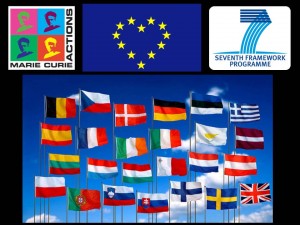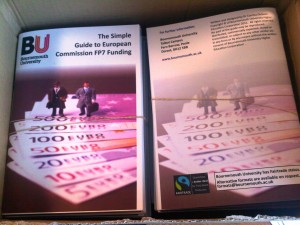 The EU blog will be very quiet over the festive period as I will be taking a couple of weeks off to indulge in a lot of food and an occasional Glühwein. I hope you have a great Christmas break and I will be back with all the latest EU related news on January 3rd 🙂
The EU blog will be very quiet over the festive period as I will be taking a couple of weeks off to indulge in a lot of food and an occasional Glühwein. I hope you have a great Christmas break and I will be back with all the latest EU related news on January 3rd 🙂
Category / EU
Welcome to the EU section of the blog! Emily Cieciura (BU’s Research Facilitator – EU and International), Jo Garrad (Funding Development Manager) and Dianne Goodman (Funding Development Co-ordinator) together try to take the pain out of finding and applying for EU funding by horizon scanning many sources and placing the most important information on this page.
We blog as often as possible on everything from calls for proposals and partner searches, to networking event opportunities, all the latest on Horizon 2020 and international funding. We also use the blog to disseminate information on EUADS (BU’s EU academic training initiative), how to write brilliant proposals, how to find partners and other top tips!
UK does brilliantly in FP7, so why not be part of it…?
The UK success rate for proposals submitted to FP7 is around 24%, compared to an average across the EU Member states of 21%. The UK is the second most successful participant both in terms of the budget share (behind Germany), so we are continually fighting our corner for funding.
The top collaborative links within FP7 for the UK are with researchers from Germany, France, Italy, Spain and the Netherlands, you can see the country success rates and statistics on the country profile section of the Commission’s new website on which also contains examples of FP7 projects that each country is involved in.
The BU EU Showcase Event – free information, cake and advice!
 Are you curious to uncover the secret of our academics success with EU funding? Do you like cake? Well the EU Showcase Event is a must-attend morning for you!
Are you curious to uncover the secret of our academics success with EU funding? Do you like cake? Well the EU Showcase Event is a must-attend morning for you!
In a very bright, lively and informal event on January 13th, several of our most EU-active researchers will be sharing information on their brilliant projects and their experiences on how they embarked on the EU funding world.
Presenters will be from a range of Schools and the day will begin by an introduction from PVC Research, Enterprise & Internationalisation Prof. Matthew Bennett. I will also be giving you more info on our fantastic EU Networking fund and EU Academic Development Schemes which will help you in your EU funding endeavours.
The event is a half day (9-12) in Kimmeridge house and tea, coffee and cake will be provided. This is a great opportunity to see the excellent EU work some of our researchers are doing, but also to find out more about how you too can get involved.
 In order to ensure we order plenty of cake and refreshments, we are asking you to register here (which takes 10 seconds).
In order to ensure we order plenty of cake and refreshments, we are asking you to register here (which takes 10 seconds).
useful European energy policy and research funding landscape meeting notes available
Our contact in Brussels, UKRO has updated its briefing note on the European energy policy and research funding landscape. The briefing will be useful to any of you researching in the area of energy as it gives key insights into future policy, funding opportunities and provides detail on ways of engaging with key European players.
briefing covers the European Strategic Energy Technology Plan (SET-Plan) and related initiatives which include the European Industry Initiatives (EIIs), the Joint research Programmes (JPs) of the European Energy Research Alliance (EERA) and the European Universities Association European Platform of Universities Engaged in Energy Research (EPUE). It also includes updated Questions and Answers, including how they relate to FP7 and Horizon 2020, and links to further sources of information and newsletters.
You can read the notes from the meeting on the UKRO webpages.
Interested in applying for FP7 ICT? this is a must-attend event!
 The European Commission will hold an information day on FP7 Information Communication Technologies (ICT) Call 9, specifically focusing on the Future and Emerging Technologies (FET) strand. This will take place on 18 January 2012 in Brussels. This is a critical opportunity to not only get top tips on your application, but is a key networking opportunity
The European Commission will hold an information day on FP7 Information Communication Technologies (ICT) Call 9, specifically focusing on the Future and Emerging Technologies (FET) strand. This will take place on 18 January 2012 in Brussels. This is a critical opportunity to not only get top tips on your application, but is a key networking opportunity
The programme will include detailed sessions on the FET Call 9 objectives, providing up-to-date and first-hand information on the four FET initiatives in FP7 ICT Call 9. Sessions will also cover the contractual, legal and administrative aspects of the application process.
The following FET themes will be addressed:
- FP7-ICT-2011.9.9: Quantum ICT (QICT) including ERA-NET-Plus
- FP7-ICT-2011.9.10: Fundamentals of Collective Adaptive Systems (FOCAS)
- FP7-ICT-2011.9.11: Neuro-Bio-Inspired Systems (NBIS)
- Co-ordinating Communities, Identifying New Research topics for FET Proactive initiatives and fostering Networking of National and Regional Research Programmes.
The event will also include a brokerage session where participants will be invited to share their research ideas. It is being held in Brussels on January 18th
Participants must register in advance for this free event. Due to limited space and high demand it is strongly recommended that you register as soon as possible.
Green Engineering Camp call for ideas from Early Stage Researchers
 The Green Engineering Camp (don’t worry there are no tents involved) aims to engage early stage researchers and investigators in real-life applications using green ICT (Information and Communication Technologies). Focusing on green engineering in the forest sector, this initiative is intended to boost knowledge transfer and come up with intelligent and innovative ways to make a wide range of forest-related activities more environmentally friendly by the use of ICT.
The Green Engineering Camp (don’t worry there are no tents involved) aims to engage early stage researchers and investigators in real-life applications using green ICT (Information and Communication Technologies). Focusing on green engineering in the forest sector, this initiative is intended to boost knowledge transfer and come up with intelligent and innovative ways to make a wide range of forest-related activities more environmentally friendly by the use of ICT.
The initiative focuses in particular on promoting contributions from early stage researchers, female participation and transdisciplinarity. The full Call for Ideas title is: ‘Intelligent Use and Development of ICT to Increase Environmental Efficiency: the Case of Production and Logistics in the Forest Sector.’
With a two stage assessment process, the initial stage (consisting of a one-page outline) is open for submissions until 31 January 2012. Successful applicants will be invited to present their ideas at the Green Engineering Camp (GEC) taking place in Plitvice National Park, Croatia from 2 to 6 July 2012.
Reminder of amazing EU funding opportunities from BU!
 Just a reminder to you all about our fantastic two EU funding opportunities from BU which have already had an overwhelming response.
Just a reminder to you all about our fantastic two EU funding opportunities from BU which have already had an overwhelming response.
The BU EU Academic Development Scheme (EUADS) is for all newbie’s in EU research, comprising of an amazing training and mentorship programme and a personal budget to help you create a proposal. The deadline for this scheme is 13.01.12
The BU EU Networking Fund (EUNF) is for anyone who wants to travel to network with potential partners. There isn’t a deadline for this but the funds are limited so be quick and don’t miss out!
More details on both schemes as well as application forms can be found in my previous blogpost.
New Horizon 2020 website launched
 To celebrate the planned developments in Horizon 2020, the EC have launched a brand spanking new set of webpages. I’m not going to lie, visually it’s not the most attractive site I’ve ever been on, but it does have a FAQ section, a timeline for Horizon 2020, a calendar of events, and a new video will be added each day until the launch from various stakeholders providing their views on the plans.
To celebrate the planned developments in Horizon 2020, the EC have launched a brand spanking new set of webpages. I’m not going to lie, visually it’s not the most attractive site I’ve ever been on, but it does have a FAQ section, a timeline for Horizon 2020, a calendar of events, and a new video will be added each day until the launch from various stakeholders providing their views on the plans.
EU funding available for higher education and training between the EU, Australia and Korea
 Industrialised Countries Instrument Call for Proposals: Co-operation in higher education and training between the EU and Australia and The Republic of Korea
Industrialised Countries Instrument Call for Proposals: Co-operation in higher education and training between the EU and Australia and The Republic of Korea
The ICI-ECP Education Cooperation Programme refers to EU cooperation with Australia, New Zealand, Japan, and the Republic of Korea in the field of higher education and vocational education and training. The programme includes regional and bilateral cooperation projects based on joint EU – Partner Countries funding and mutual agreement on the selection of higher education partnerships.
This 2011 ICI-ECP Call for Proposals supports co-operation with Australia and the Republic of Korea by means of Joint Degree and Joint Mobility projects. Such projects focus on structured exchanges of students and faculty members; and on the joint development of joint, or shared curricula and joint study programmes, as well as on the award of joint or double degrees in the case of Joint Degree projects.
All Joint Degree and Joint Mobility projects must address: development of innovative international curricula; student services, language and cultural preparation; organisational frameworks for student mobility and faculty members’ mobility; evaluation; sustainability and dissemination.
The Call is open to consortia of higher education institutions in the case of Joint Degree Projects or vocational and training institutions in the case of Joint Mobility Projects. The total budget available amounts to approximately EUR 2.3 million.
You can contact the dedicated Industrialised Countries Selection team for further information.
New Belgian Marie Curie Fellowships available
 The Research Foundation – Flanders (FWO) has launched the first call for its new funding programme for postdoctoral researchers: PEGASUS Marie Curie Fellowships. These fellowships are co-funded by the FP7 Marie Curie Programme. The goals of PEGASUS are:
The Research Foundation – Flanders (FWO) has launched the first call for its new funding programme for postdoctoral researchers: PEGASUS Marie Curie Fellowships. These fellowships are co-funded by the FP7 Marie Curie Programme. The goals of PEGASUS are:
- to attract excellent postdoctoral researchers to Flanders in order to contribute to the advancement of Flemish science
- to provide the selected fellows with optimal conditions to further develop their research career in Flanders or abroad
PEGASUS aims at incoming mobility and/or reintegration of researchers working abroad. Candidates have to hold a PhD and should not have carried out their main activity (work, studies, etc.) in Belgium for more than 12 months in the 3 years immediately prior to the start of the fellowship.
Within PEGASUS two options are possible:
- Pegasus-long: Postdoctoral fellowships of 3 years at a Flemish university. The fellowship is renewable once in open competition with the regular FWO postdoctoral fellows. 30 Pegasus-long fellowships are available, to be granted in a single call.
- Pegasus-short: Postdoctoral fellowships of 1 year at a Flemish university. The fellowship is not renewable, but candidates can apply afterwards in the open competition for a regular postdoctoral fellowship. This short fellowship is available under the form of an employment contract (standard option) or a stipend (exceptional cases).
-
More information on this programme and on the submission of proposals are available from the FWO Pegasus Programme Website.
Swedes spend tenth of research time applying for funding
 How long do you spend writing funding proposals and how does this compare elsewhere in Europe? According to a recent analysis by the Swedish National Agency for Higher Education, Swedish researchers spend 10% of their research time applying for funding. Based on data from 2009, lecturers spend 40 per cent of their time on research and of this, 10% is spent applying for external funds, which makes up roughly half of the research funding at Sweden’s universities.
How long do you spend writing funding proposals and how does this compare elsewhere in Europe? According to a recent analysis by the Swedish National Agency for Higher Education, Swedish researchers spend 10% of their research time applying for funding. Based on data from 2009, lecturers spend 40 per cent of their time on research and of this, 10% is spent applying for external funds, which makes up roughly half of the research funding at Sweden’s universities.
Good news – Parliament supports 10% rise in EU research budget
 The budget committee of the European Parliament has said it wants to maintain a planned increase of 10 per cent in the EU research budget for 2012. Under the committee’s proposal, research would obtain the largest increase of any major category of spending, as envisaged in the framework already agreed for spending from 2007 to 2013. However, in response to the financial crisis, the Council of Ministers has requested that research spending in 2012 be cut from the planned €12.56 billion to €11.43bn, in effect remaining the same as last year.
The budget committee of the European Parliament has said it wants to maintain a planned increase of 10 per cent in the EU research budget for 2012. Under the committee’s proposal, research would obtain the largest increase of any major category of spending, as envisaged in the framework already agreed for spending from 2007 to 2013. However, in response to the financial crisis, the Council of Ministers has requested that research spending in 2012 be cut from the planned €12.56 billion to €11.43bn, in effect remaining the same as last year.
New simple EC FP7 guide coming to you!
It is with great pleasure I can announce that the printed copies of ‘The Simple Guide to European Commission FP7 Funding’ I have been working on over the last few months have arrived. This guide covers everything you need to know – from funding topics, to searching for partners, to completing the proposal form – all in a jargon free, simple format.
I have popped a copy for every research active academic at BU in the internal post. If you haven’t received one by Friday and would like me to send you one, please drop me an email. Happy reading! 
EU funding from BU available
 Just a reminder to you all about our fantastic two EU funding opportunities which were launched last week and already generated much interest.
Just a reminder to you all about our fantastic two EU funding opportunities which were launched last week and already generated much interest.
The BU EU Academic Development Scheme (EUADS) is for all newbie’s in EU research, comprising of an amazing training and mentorship programme and a personal budget to help you create a proposal. The deadline for this scheme is 13.01.12
The BU EU Networking Fund (EUNF) is for anyone who wants to travel to network with potential partners. There isn’t a deadline for this but the funds are limited so be quick and don’t miss out!
More details on both schemes as well as application forms can be found in my previous blogpost!
Proposals set for a Supersized Erasmus Programme
 The EC has proposed **Supersized** version of the Erasmus Prorgramme with a whopping 70% increase in funding and more wide ranging for education funding 2014-2020 called ‘Erasmus for All’ (totaling €19-billion).
The EC has proposed **Supersized** version of the Erasmus Prorgramme with a whopping 70% increase in funding and more wide ranging for education funding 2014-2020 called ‘Erasmus for All’ (totaling €19-billion).
Erasmus for All would merge the 7 existing programmes, such as the Lifelong Learning or Youth in Action programmes, under one single banner to increase efficiency, make it easier to apply for funding, reduce fragmentaton and duplication.
Erasmus for All aims to enable education systems to ‘deliver the knowledge and skills needed in an increasingly globalised labour market’, according to the EC. Several programme names, such as Leonardo or Comenius, will disappear and be branded as Erasmus actions. “In setting up an integrated single programme, it makes sense to avoid multiple names and to capitalise on the popularity and awareness of the Erasmus brand” the EC said.
The programme would include three “key actions”: learning mobility (66% of the budget), including funding for student and staff mobility; cooperation for innovation (26%), to increase links between education and business, as well as between Europe and other regions; and policy reform (5%), including the modernisation of higher education and Bologna reform. The remaining 3 % of the programme’s budget would fund operating costs in national agencies.
The proposal will now be discussed by the European Parliament and Member States through the Council of the EU. It is expected that there might be some modifications to the proposal during the co-decision process, which is expected to be completed by the end of 2013 to allow the new programme to start on 1 January 2014.
Applying to the EC for funding? Simples!
 One of the major criticisms of EC funding is the complication of funding, rules and paperwork. Horizon 2020 seems a huge merger of activities which have been funded in FP7 under several different programmes, and generic rules are being developed in order to create substantial simplification for participants.
One of the major criticisms of EC funding is the complication of funding, rules and paperwork. Horizon 2020 seems a huge merger of activities which have been funded in FP7 under several different programmes, and generic rules are being developed in order to create substantial simplification for participants.
Horizon 2020 will address the call from participants around Europe for a pragmatic shift towards administrative and financial simplification and states that the management of European research funding should be more trust-based and risk-tolerant towards participants.
Simple funding rules should reduce the administrative costs for participation and will contribute to a reduction of financial errors so good news all round!
Phew – Marie Curie here to stay til 2020!
 I am delighted to announce that Marie Curie Actions (which normally sit in the People Programme of FP7) looks like it is here to stay!
I am delighted to announce that Marie Curie Actions (which normally sit in the People Programme of FP7) looks like it is here to stay!
The goal of Marie Curie in Horizon 2020 is to ensure optimum development and dynamic use of Europe’s intellectual capital in order to generate new skills and innovation and, thus, to realise its full potential across all sectors and regions. The EC sees well-trained, dynamic and creative researchers as the vital raw material for the best science and the most productive research-based innovation.
THE EC feels that Europe hosts a large and diversified pool of skilled academics and l this needs to be constantly replenished, improved and adapted to the rapidly evolving needs of the labour market; particularly as a disproportionate number of researchers will hit retirement over the next few years and the research intensity of the EU economy is increasing.
 The goal is, by leveraging additional funds, to increase the numerical and structural impact of this scheme and to foster excellence at national level in researchers training, mobility and career development. Additional goals are to monitor progress, identify gaps and to increase their impact. Indicators shall be developed and data related to researchers‘ mobility, skills and careers analysed, seeking synergies and close coordination with the policy support actions on researchers, their employers and funders carried out under the ” Inclusive, innovative and secure societies” challenge.
The goal is, by leveraging additional funds, to increase the numerical and structural impact of this scheme and to foster excellence at national level in researchers training, mobility and career development. Additional goals are to monitor progress, identify gaps and to increase their impact. Indicators shall be developed and data related to researchers‘ mobility, skills and careers analysed, seeking synergies and close coordination with the policy support actions on researchers, their employers and funders carried out under the ” Inclusive, innovative and secure societies” challenge.
The EC will target early career researchers – either doctoral or postdoc – and call for EU to develop state-of-the-art, innovative training schemes, consistent with the highly competitive and increasingly inter-disciplinary requirements of research and innovation. Strong involvement of businesses, including SMEs and other socio-economic actors, will be needed to equip researchers with the innovation skills demanded by the jobs of tomorrow. It will also be important to enhance the mobility of these researchers, as it currently remains at too modest a level: in 2008, only 7 % of European doctoral candidates were trained in another Member State, whereas the target is 20 % by 2030. Mid-career mobility will also be targeted not only between countries, but also between the public and private sectors as this creates a strong stimulus for learning and developing new skills and is a key factor in cooperation between academics, research centres and industry across countries.
Former Marie Curie schemes have fostered some excellent results and this will continue with future Marie Curie Actions which will encourage new, creative and innovative types of training such as industrial doctorates, involving education, research and innovation players who will have to compete globally for a reputation of excellence. By providing Union funding for the best research and training programmes following the Principles for Innovative Doctoral Training in Europe, they will also promote wider dissemination and take-up, moving towards more structured doctoral training. Marie Curie grants will also be extended to the temporary mobility of experienced researchers and engineers from public institutions to the private sector or vice versa, thereby encouraging and supporting universities, research centres and businesses to cooperate with one another on a European and international scale.
Funding will most likely be around the following 4 areas:
- Fostering new skills by means of excellent initial training of researchers: The goal is to train a new generation of creative and innovative researchers, able to convert knowledge and ideas into products and services for economic and social benefit in the Union. Key activities shall be to provide excellent and innovative training to early-stage researchers at post-graduate level via interdisciplinary projects or doctoral programmes involving universities, research institutions, businesses, SMEs and other socio-economic groups from different countries. This will improve career prospects for young post-graduate researchers in both the public and private sectors.
- Nurturing excellence by means of cross-border and cross-sector mobility: The goal is to enhance the creative and innovative potential of experienced researchers at all career levels by creating opportunities for cross-border and cross-sector mobility. Key activities shall be to encourage experienced researchers to broaden or deepen their skills by means of mobility by opening attractive career opportunities in universities, research institutions, businesses, SMEs and other socio-economic groups all over Europe and beyond. Opportunities to restart a research career after a break shall also be supported.
- Stimulating innovation by means of cross-fertilisation of knowledge: Key activities shall be to support short-term exchanges of research and innovation staff among a partnership of universities, research institutions, businesses, SMEs and other socio-economic groups, both within Europe and worldwide. This will include fostering cooperation with third countries.
- Increasing the structural impact by co-funding the activities: Key activities shall be, with the aid of a co-funding mechanism, to encourage regional, national and international organisations to create new programmes and to open existing ones to international and intersectoral training, mobility and career development. This will increase the quality of research training in Europe at all career stages, including at doctoral level, will foster free circulation of researchers and scientific knowledge in Europe, will promote attractive research careers by offering open recruitment and attractive working conditions and will support research and innovation cooperation between universities, research institutions and enterprises and cooperation with third countries and international organisations.
Tackling Europe’s Societal Challenges
 Yesterday’s blog post highlighted that a draft document we have obtained from the European Commission on Horizon 2020 has indicated that a major area of focus for research funding will be on Societal Challenges. This theme will incorporate EU policy and will focus on bringing together a critical mass of resources and knowledge across different fields, technologies and scientific disciplines. Societal Challenges will be addressed through activities which cover the full cycle from research to market, with a focus on innovation-related activities, such as piloting, demonstration, test-beds, support for public procurement, social innovation and market take-up of innovations.
Yesterday’s blog post highlighted that a draft document we have obtained from the European Commission on Horizon 2020 has indicated that a major area of focus for research funding will be on Societal Challenges. This theme will incorporate EU policy and will focus on bringing together a critical mass of resources and knowledge across different fields, technologies and scientific disciplines. Societal Challenges will be addressed through activities which cover the full cycle from research to market, with a focus on innovation-related activities, such as piloting, demonstration, test-beds, support for public procurement, social innovation and market take-up of innovations.
Six thematic areas are included:
- Health, demographic change and well-being;
- Food security, sustainable agriculture and the bio-economy;
- Secure, clean and efficient energy;
- Smart, green and integrated transport;
- Climate action, resource efficiency and raw materials;
- Inclusive, innovative and secure societies
I have summarised information contained in the draft Horizon 2020 document for you on each of these areas. Information includes the focus of the thematic area, the rationale behind it and likely areas and activities to be funded. This is a draft document so nothing is set in stone as yet, but it is definitely worth preparing for this now so you and your partners are ready for calls being released in 2013/14.
This information is highly confidential and not to be circulated outside of BU and can therefore be found on the I Drive: I:\CRKT\Public\Horizon 2020











 Read and sign up to BU’s Policy Influence Digest
Read and sign up to BU’s Policy Influence Digest Upcoming opportunities for PGRs – collaborate externally
Upcoming opportunities for PGRs – collaborate externally BU involved in new MRF dissemination grant
BU involved in new MRF dissemination grant New COVID-19 publication
New COVID-19 publication MSCA Postdoctoral Fellowships 2024
MSCA Postdoctoral Fellowships 2024 Horizon Europe News – December 2023
Horizon Europe News – December 2023